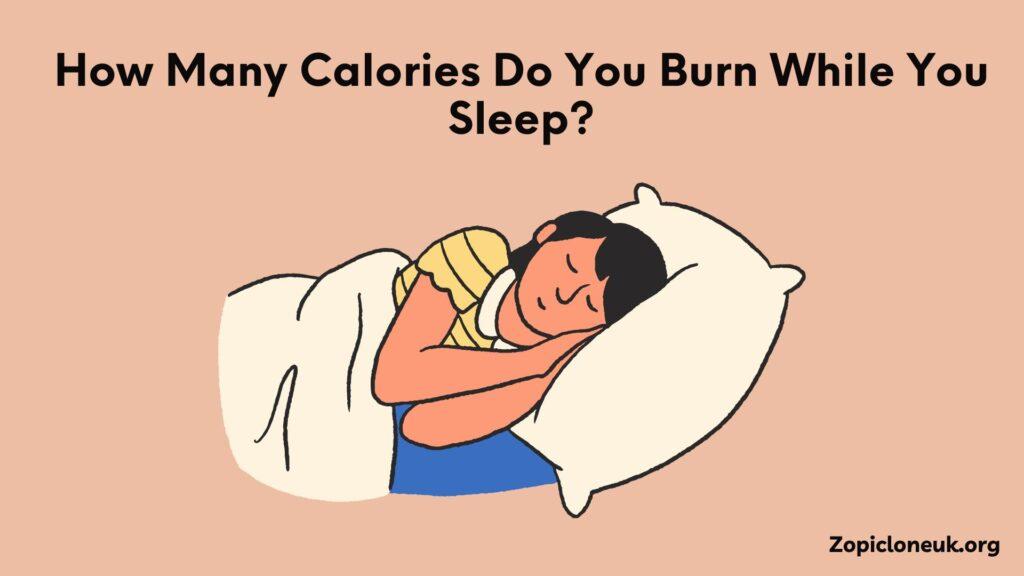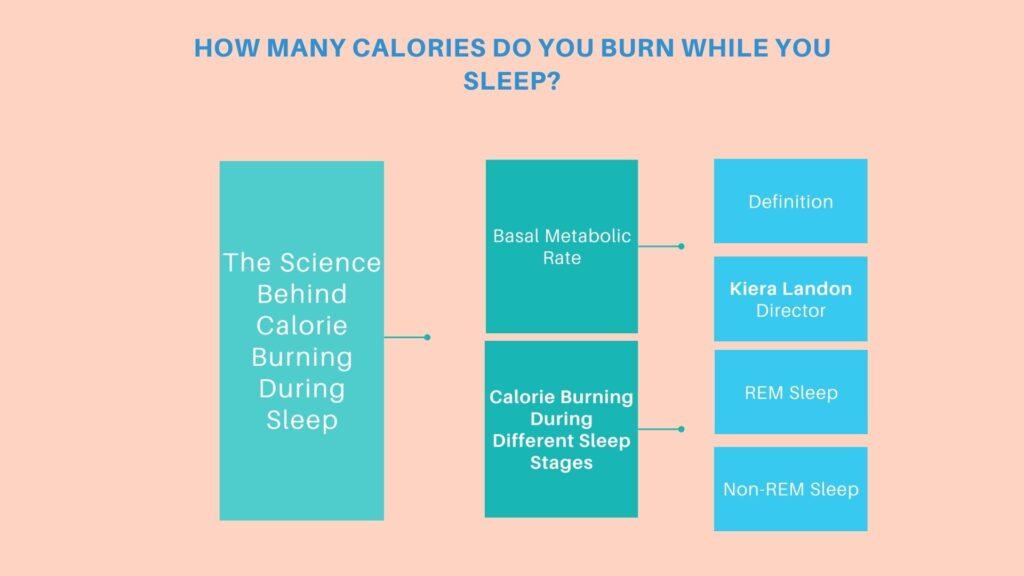
How Many Calories Do You Burn While You Sleep:- Sleep is a vital component of our daily lives, essential for physical and mental health. While we often focus on diet and exercise for weight management, an intriguing aspect is how many calories we burn while we sleep. This blog delves into the science behind calorie burning during sleep, the factors affecting it, and its implications for overall health.
Sleep is often perceived as a time when the body shuts down, but this is far from the truth. During sleep, the body undergoes numerous processes essential for repair, growth, and overall maintenance. One fascinating aspect is the number of calories burned while we are in this restful state. Understanding this can offer insights into our metabolism and how our bodies manage energy.
Contents
- 0.0.1 The Science Behind Calorie Burning During Sleep
- 0.0.2 How Many Calories Do You Burn While Sleeping?
- 0.0.3 Factors That Affect Calorie Burning During Sleep
- 0.0.4 The Role of Sleep Quality in Calorie Burning
- 0.0.5 Benefits of Understanding Calorie Burning During Sleep
- 0.0.6 Tips to Enhance Calorie Burning During Sleep
- 0.0.7 FAQs
- 0.0.8 Conclusion
- 1 Author Details
The Science Behind Calorie Burning During Sleep
Calorie burning, or energy expenditure, continues even when we are asleep. The body requires energy to maintain essential functions, such as breathing, circulation, cell repair, and temperature regulation. This energy expenditure during rest is known as the Basal Metabolic Rate (BMR). BMR accounts for the majority of our daily calorie burn, even more than physical activities.

- Basal Metabolic Rate (BMR):
- Definition: BMR is the rate at which the body uses energy while at rest to maintain vital functions.
- Factors Influencing BMR: Age, gender, weight, muscle mass, and overall health influence BMR. For instance, individuals with more muscle mass tend to have higher BMR.
- Calorie Burning During Different Sleep Stages:
- REM Sleep: Rapid Eye Movement (REM) sleep is when we dream. The brain is highly active, leading to higher calorie expenditure.
- Non-REM Sleep: This is the deeper, restorative phase of sleep. Calorie burn is lower compared to REM sleep but still significant.
How Many Calories Do You Burn While Sleeping?
Calculating the exact number of calories burned while sleeping involves considering various factors like weight, sleep duration, and overall metabolism. On average, a person burns about 0.42 calories per pound of body weight per hour of sleep. For example, a 150-pound person might burn around 63 calories per hour, totaling approximately 504 calories during an 8-hour sleep cycle.
- Example Calculation:
- Weight: 150 pounds
- Calories Burned per Hour: 0.42 calories per pound
- Total for 8 Hours: 150 x 0.42 x 8 = 504 calories
- Influencing Factors:
- Body Composition: Higher muscle mass increases calorie burning.
- Age and Gender: Younger individuals and males generally have higher BMR.
- Health Conditions: Conditions like hyperthyroidism can elevate BMR, leading to more calories burned during sleep.
Factors That Affect Calorie Burning During Sleep
Several factors can influence how many calories you burn while you sleep. These include:
- Body Composition: Muscle tissue burns more calories than fat. Therefore, individuals with higher muscle mass burn more calories even at rest.
- Age: Metabolism generally slows with age, reducing the number of calories burned during sleep.
- Gender: Men typically have a higher BMR than women due to greater muscle mass.
- Genetic Factors: Genetics can influence metabolic rate and, consequently, calorie burning during sleep.
- Health and Lifestyle: Overall health, diet, and physical activity levels also play a role. Regular exercise can boost metabolism, leading to higher calorie burn even during sleep.
The Role of Sleep Quality in Calorie Burning
Quality of sleep is crucial in determining how many calories are burned. Poor sleep can disrupt metabolic processes and reduce the effectiveness of calorie burning.
- Impact of Sleep Disorders: Conditions like sleep apnea can negatively affect metabolism and reduce calorie expenditure.
- Sleep Duration: Both insufficient and excessive sleep can affect metabolic rates. Optimal sleep duration for most adults is 7-9 hours per night.
- Sleep Hygiene: Good sleep hygiene practices, such as maintaining a regular sleep schedule and creating a restful environment, can improve sleep quality and metabolic health.
Benefits of Understanding Calorie Burning During Sleep
Knowing how many calories are burned during sleep can be beneficial for weight management and overall health. It highlights the importance of sleep in maintaining a healthy metabolism and energy balance.
- Weight Management: Adequate sleep supports weight management by balancing energy expenditure and intake.
- Metabolic Health: Good sleep promotes efficient metabolic processes, reducing the risk of metabolic disorders.
- Holistic Health Approach: Incorporating sleep into a holistic approach to health emphasizes the interconnectedness of sleep, diet, and physical activity.
Tips to Enhance Calorie Burning During Sleep
While you can’t control how many calories you burn during sleep directly, you can adopt strategies to optimize your metabolism:
- Regular Exercise: Engage in regular physical activity to build muscle mass and boost metabolism.
- Healthy Diet: Eat a balanced diet rich in nutrients to support metabolic health.
- Good Sleep Hygiene: Maintain a regular sleep schedule, create a restful environment, and avoid stimulants before bedtime.
- Manage Stress: Chronic stress can negatively impact metabolism. Practice stress-reducing techniques like mindfulness and relaxation exercises.
FAQs
- How can I increase the number of calories burned during sleep?
- Building muscle mass through regular exercise and maintaining good sleep hygiene can help increase calorie burning during sleep.
- Does poor sleep affect calorie burning?
- Yes, poor sleep quality and sleep disorders can reduce the effectiveness of calorie burning during sleep and negatively impact metabolic health.
- Is there a difference in calorie burning between REM and non-REM sleep?
- Yes, calorie burning is higher during REM sleep due to increased brain activity compared to non-REM sleep.
- How does body weight affect calorie burning during sleep?
- Heavier individuals burn more calories during sleep because their bodies require more energy to maintain essential functions.
- Can diet influence how many calories I burn while sleeping?
- A healthy diet supports overall metabolic health, which can indirectly affect the number of calories burned during sleep.
Conclusion
Understanding how many calories you burn while you sleep offers valuable insights into your metabolism and overall health. Sleep is not just a period of rest; it is a dynamic state where significant energy expenditure occurs. By prioritizing quality sleep, maintaining a healthy lifestyle, and adopting good sleep hygiene practices, you can enhance your metabolic health and support weight management goals.
Author Details




Medical content by qualified psychiatrists
Our editorial policy

Zopiclone precautions Read our potential abuse notice

Looking for a seller? Locate the best Zopiclone vendor






